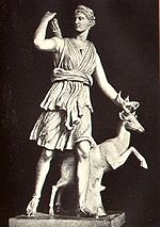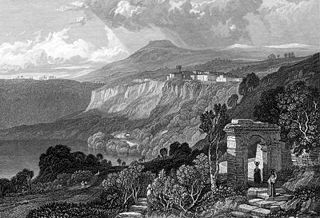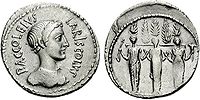
Rex Nemorensis
Encyclopedia

Ariccia
Ariccia is a town and comune in the Province of Rome, central Italy. It is in the Alban Hills of the Lazio region and could be considered an extension of Rome's southeastern suburbs...
in Italy
Italy
Italy , officially the Italian Republic languages]] under the European Charter for Regional or Minority Languages. In each of these, Italy's official name is as follows:;;;;;;;;), is a unitary parliamentary republic in South-Central Europe. To the north it borders France, Switzerland, Austria and...
, by the shores of Lake Nemi
Lake Nemi
Lake Nemi is a small circular volcanic lake in the Lazio region of Italy south of Rome, taking its name from Nemi, the largest town in the area, that overlooks it from a height.-Archaeology and history:The lake is most famous for its sunken Roman ships...
, where she was known as Diana Nemorensis
Diana Nemorensis
Diana Nemorensis, "Diana of Nemi" also known as “Diana of the Wood”, was an Italic form of the goddess who became Hellenised during the fourth century BCE and conflated with Artemis. Her sanctuary was to be found on the northern shore of Lake Nemi beneath the cliffs of the modern city Nemi...
. The priesthood played a major role in the mythography
Mythography
A mythographer, or a mythologist is a compiler of myths. The word derives from the Greek "μυθογραφία" , "writing of fables", from "μῦθος" , "speech, word, fact, story, narrative" + "γράφω" , "to write, to inscribe". Mythography is then the rendering of myths in the arts...
of J.G. Frazer in The Golden Bough
The Golden Bough
The Golden Bough: A Study in Magic and Religion is a wide-ranging, comparative study of mythology and religion, written by Scottish anthropologist Sir James George Frazer . It first was published in two volumes in 1890; the third edition, published 1906–15, comprised twelve volumes...
, whose interpretation has exerted a lasting influence.
Ancient sources
The tale of the rex Nemorensis is told in a number of ancient sources. The Latin name of the priesthood is given by SuetoniusSuetonius
Gaius Suetonius Tranquillus, commonly known as Suetonius , was a Roman historian belonging to the equestrian order in the early Imperial era....
: "He caused the rex Nemorensis, who had held his priesthood for many years, to be supplanted by a stronger adversary." Ovid
Ovid
Publius Ovidius Naso , known as Ovid in the English-speaking world, was a Roman poet who is best known as the author of the three major collections of erotic poetry: Heroides, Amores, and Ars Amatoria...
gives a poetic account of the priesthood of Nemi in his Fasti, Book 3 (on the month of March
Roman calendar
The Roman calendar changed its form several times in the time between the founding of Rome and the fall of the Roman Empire. This article generally discusses the early Roman or pre-Julian calendars...
), noting that the lake of Nemi was "sacred to antique religion," and that the priest who dwelt there "holds his reign by strong hands and fleet feet, and dies according to the example he set himself."
The Greek geographer Strabo
Strabo
Strabo, also written Strabon was a Greek historian, geographer and philosopher.-Life:Strabo was born to an affluent family from Amaseia in Pontus , a city which he said was situated the approximate equivalent of 75 km from the Black Sea...
also mentions the institution: "and in fact a barbaric, and Scythia
Scythia
In antiquity, Scythian or Scyths were terms used by the Greeks to refer to certain Iranian groups of horse-riding nomadic pastoralists who dwelt on the Pontic-Caspian steppe...
n, element predominates in the sacred usages, for the people set up as priest merely a run-away slave who has slain with his own hand the man previously consecrated to that office; accordingly the priest is always armed with a sword, looking around for the attacks, and ready to defend himself."
Pausanias
Pausanias (geographer)
Pausanias was a Greek traveler and geographer of the 2nd century AD, who lived in the times of Hadrian, Antoninus Pius and Marcus Aurelius. He is famous for his Description of Greece , a lengthy work that describes ancient Greece from firsthand observations, and is a crucial link between classical...
gives an etiological
Etiology
Etiology is the study of causation, or origination. The word is derived from the Greek , aitiologia, "giving a reason for" ....
myth on the founding
Founding myth
A national myth is an inspiring narrative or anecdote about a nation's past. Such myths often serve as an important national symbol and affirm a set of national values. A national myth may sometimes take the form of a national epic...
of the shrine:

In Roman mythology
Roman mythology
Roman mythology is the body of traditional stories pertaining to ancient Rome's legendary origins and religious system, as represented in the literature and visual arts of the Romans...
, Hippolytus was deified as the god Virbius; Artemis
Artemis
Artemis was one of the most widely venerated of the Ancient Greek deities. Her Roman equivalent is Diana. Some scholars believe that the name and indeed the goddess herself was originally pre-Greek. Homer refers to her as Artemis Agrotera, Potnia Theron: "Artemis of the wildland, Mistress of Animals"...
was the Greek name of the goddess identified with the Roman
Interpretatio graeca
Interpretatio graeca is a Latin term for the common tendency of ancient Greek writers to equate foreign divinities to members of their own pantheon. Herodotus, for example, refers to the ancient Egyptian gods Amon, Osiris and Ptah as "Zeus", "Dionysus" and "Hephaestus", respectively.-Roman...
Diana. A possible allusion to the origins of the priesthood at Nemi is contained in Vergil's Aeneid
Aeneid
The Aeneid is a Latin epic poem, written by Virgil between 29 and 19 BC, that tells the legendary story of Aeneas, a Trojan who travelled to Italy, where he became the ancestor of the Romans. It is composed of roughly 10,000 lines in dactylic hexameter...
, as Virgil places Hippolytus at the grove of Aricia.
An alternative story has the worship of Diana at Nemi instituted by Orestes
Orestes
Orestes was the son of Agamemnon in Greek mythology; Orestes may also refer to:Drama*Orestes , by Euripides*Orestes, the character in Sophocles' tragedy Electra*Orestes, the character in Aeschylus' trilogy of tragedies, Oresteia...
; the flight of the slave represents the flight of Orestes into exile.
Ritual murder
Surviving lore concerning the rex Nemorensis tells the tale that this priest or king held a very uneasy position. Macaulay's quatrain on the institution of the rex Nemorensis states:- Those trees in whose dim shadow
The ghastly priest doth reign
The priest who slew the slayer,
And shall himself be slain.
This is, in a nutshell, the surviving legend of the rex Nemorensis: the priesthood of Diana at Nemi was held by a person who obtained that honour by slaying the prior incumbent in a trial by combat
Trial by combat
Trial by combat was a method of Germanic law to settle accusations in the absence of witnesses or a confession, in which two parties in dispute fought in single combat; the winner of the fight was proclaimed to be right. In essence, it is a judicially sanctioned duel...
, and who could remain at the post only so long as he successfully defended his position against all challengers. However, a successful candidate had first to test his mettle by plucking a golden bough from one of the trees in the sacred grove
Sacred grove
A sacred grove is a grove of trees of special religious importance to a particular culture. Sacred groves were most prominent in the Ancient Near East and prehistoric Europe, but feature in various cultures throughout the world...
.
The human sacrifice
Human sacrifice
Human sacrifice is the act of killing one or more human beings as part of a religious ritual . Its typology closely parallels the various practices of ritual slaughter of animals and of religious sacrifice in general. Human sacrifice has been practised in various cultures throughout history...
conducted at Nemi was thought to be highly unusual by the ancients. Suetonius mentions it as an example of the moral failings of Caligula
Caligula
Caligula , also known as Gaius, was Roman Emperor from 37 AD to 41 AD. Caligula was a member of the house of rulers conventionally known as the Julio-Claudian dynasty. Caligula's father Germanicus, the nephew and adopted son of Emperor Tiberius, was a very successful general and one of Rome's most...
. Strabo calls it Scythia
Scythia
In antiquity, Scythian or Scyths were terms used by the Greeks to refer to certain Iranian groups of horse-riding nomadic pastoralists who dwelt on the Pontic-Caspian steppe...
n, implying that he found it barbaric
Barbarian
Barbarian and savage are terms used to refer to a person who is perceived to be uncivilized. The word is often used either in a general reference to a member of a nation or ethnos, typically a tribal society as seen by an urban civilization either viewed as inferior, or admired as a noble savage...
. The violent character of this singular institution could barely be justified by reference to its great antiquity and mythological sanctity. The ancient sources also appear to concur that an escaped slave who seeks refuge in this uneasy office is likely to be a desperate man.
The Golden Bough
James George Frazer, in his seminal work The Golden BoughThe Golden Bough
The Golden Bough: A Study in Magic and Religion is a wide-ranging, comparative study of mythology and religion, written by Scottish anthropologist Sir James George Frazer . It first was published in two volumes in 1890; the third edition, published 1906–15, comprised twelve volumes...
, argued that the tale of the priesthood of Nemi was an instance of a worldwide myth of a sacred king
Sacred king
In many historical societies, the position of kingship carries a sacral meaning, that is, it is identical with that of a high priest and of judge. The concept of theocracy is related, although a sacred king need not necessarily rule through his religious authority; rather, the temporal position...
who must periodically die as part of a regular fertility rite
Fertility rite
Fertility rites are religious rituals that reenact, either actually or symbolically, sexual acts and/or reproductive processes: 'sexual intoxication is a typical component of the...rites of the various functional gods who control reproduction, whether of man, beast, cattle, or grains of seed'..They...
. While later anthropology
Anthropology
Anthropology is the study of humanity. It has origins in the humanities, the natural sciences, and the social sciences. The term "anthropology" is from the Greek anthrōpos , "man", understood to mean mankind or humanity, and -logia , "discourse" or "study", and was first used in 1501 by German...
is sceptical of Frazer's broad hypothesis, it had an extensive influence. As a consequence, the notion of a sacred king who must periodically be slain by his rival as part of a fertility rite is likely to be more familiar to contemporary readers than it was to the ancients.
In 1990, a radio progamme entitled "The Priest of Nemi" was produced by Michael Bakewell and broadcast on BBC Radio 3, to celebrate the publication by Macmillan of the book "The Making of the Golden Bough" by Robert Fraser, itself timed to mark the centenary of the appearance of the first edition of Frazer's book.
External links
- Nemi at Nottingham project
- The Oleaster at the End of the Æneid by Julia Dyson
- Lays of Ancient Rome by Baron Thomas Babington Macaulay Macaulay from Project Gutenberg

